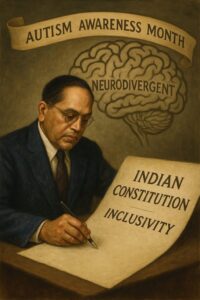Inclusion for All: Ambedkar’s Vision, Youth Voices, and Autism Awareness
Musaib Bilal

April isn’t only the time to remember the historical legacies such as Dr. B.R. Ambedkar; it is Autism Acceptance and Awareness Month as well — a great reminder that inclusion is neither nice nor desirable, but a requirement. To autistic and other neurodivergent individuals, inclusion can mean empowerment or seclusion. As we celebrate Ambedkar’s dream of equality, we also recommit to building spheres where neurodiverse voices are heard, respected, and cherished.
What is Inclusion?
Inclusion is the conscious effort to make spaces where everyone is treated with respect, supported, and enabled to contribute. It involves going beyond tokenism and intentionally breaking down barriers to participate. For autistics, this involves grasping communication difference, sensory requirements, and the need for understanding environments free of judgement and misconception.
Inclusion acknowledges that the world is viewed differently by individuals. Autistic youth, for example, may be confronted by worlds that fail to understand their sensory sensitivities or communication approach. Inclusion honours such differences and adapts to embrace them, not requiring people to conform to traditional norms.
Why Inclusion Matters
Exclusion creates isolation, and isolation is hope’s quiet assassin. For autistics, particularly in school and social settings, exclusion most often comes across as being excluded from conversation, possibilities, or even basic interactions. This exclusion stimulates “micro-depressions” — insidious, long-term emotional scars from everyday invalidation and misperception.
In non-inclusive settings, autistic individuals tend to experience “masking,” which involves hiding who they are to blend in. This continuous strain can result in burnout, anxiety, and extreme mental health issues. Inclusion, however, enables individuals to be themselves, minimizing stress and maximizing emotional well-being.
Dr. Ambedkar knew this well. He realized that being kept out of education, decision-making, and society in general was not merely a political wrong but an immense emotional and psychological wound. His struggle for Dalit dignity is akin to the current struggle for autistic acceptance — both are struggles to see the full humanity of all individuals.
Dr. Ambedkar and Inclusive Decision-Making
Ambedkar’s contribution to the making of the Indian Constitution was revolutionary. He constructed a system that had dignity and equality at its foundation. He was of the opinion that decision-making must be representative of the diversity of society so that those silenced in the past would be heard.
If Ambedkar were alive today, he would certainly champion inclusive policies that acknowledge neurodiversity and mental health as part of social justice. He would remind us that democracy truly means everyone — not just because of their politics, but also because of their neurological composition.
Youth Inclusion and the Role of NSS
Young people are the builders of tomorrow’s inclusive society. Through schemes such as the National Service Scheme (NSS), young people are being taught empathy, service, and active citizenship. NSS programs focused on disability awareness, mental health care, and neurodiversity education are crucial in developing an inclusive society from the ground up.
When youth participate in inclusion initiatives — through autism acceptance drives or establishing sensory-friendly community spaces — they continue Ambedkar’s legacy in effective manners. NSS provides them with the means to convert awareness into action.
The Interconnectedness of Youth, Ambedkar, NSS, and Autism Awareness
Ambedkar gave the marginalised the power to take back their place in society. Youth movements, particularly through NSS, have the ability to continue this vision by advocating neurodivergent voices. When young leaders advocate for autism acceptance, they break down destructive stereotypes and create empathetic communities.
This connection is cyclical:
Ambedkar’s philosophy instils the value of dignity and representation.
NSS gives the platform to young people to implement these values.
Youth engagement ensures that autism awareness and mental health advocacy remain at the forefront of social change.
Together, they create a force powerful enough to challenge exclusion in all its forms.
Oppression, Depression, and the Mental Health Costs of Non-Inclusion
Exclusion is a subtle form of oppression. For autistics, chronic exclusion can create a feeling of invisibility that fuels anxiety and depression. These are usually discounted, being categorized as “micro-depressions” brought about by everyday invalidations and micro-aggressions.
Additionally, chronic micro-aggressions — seemingly minor slighting or belittling remarks — build up over time, solidifying feelings of worthlessness. Identifying these damages is critical if we are to create truly inclusive communities that foster mental health.
Inclusion isn’t merely access; it is affirmation. It is affirming, “You belong here, just as you are.”
Towards a Truly Inclusive Future
As we celebrate Autism Acceptance Month and pay tribute to the life and cause of Dr. B.R. Ambedkar, let us pledge to create a society in which inclusion becomes the rule and not the exception. Let us empower our young people, on platforms such as NSS, to spearhead this movement with grit and empathy.
By embracing neurodiversity and acknowledging the deeper effects of inclusion on mental wellbeing, we don’t just reinforce Ambedkar’s legacy — we build a world where any person, wherever they are, whatever they have, can exist with dignity, joy, and belonging.
The writer is an author, columnist, speaker and is pursuing Bachelor’s at Amar Singh College. Can be reached at: musaibbilal.216061@gmail.com